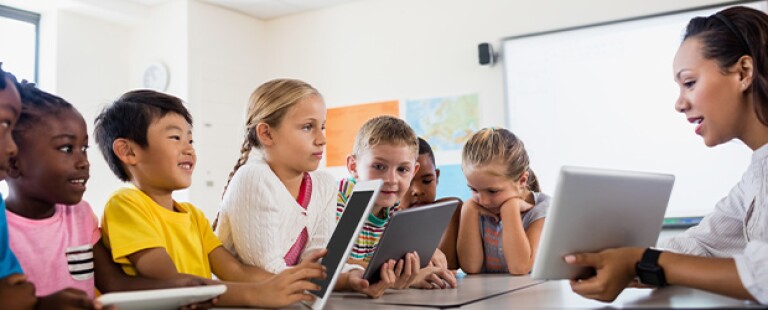Discovering the Various Mentor Strategies in Key Scientific Research Education And Learning Today
The landscape of key scientific research education and learning is advancing, with different teaching methods gaining prominence in modern classrooms. Inquiry-based discovering, hands-on experiments, and the integration of modern technology are redefining just how instructors engage young minds. Additionally, collaborative approaches and set apart direction are being utilized to accommodate the diverse needs of pupils, improving both engagement and understanding. As we examine these methodologies, inquiries develop concerning their effectiveness and the implications for future educational techniques. What might these shifts in strategy mean for the next generation of students?
Inquiry-Based Understanding
Inquiry-Based Learning (IBL) is a pedagogical strategy that encourages trainees to discover clinical concepts with wondering about, investigation, and hands-on experimentation. This technique stresses the role of students as energetic participants in their learning, promoting essential reasoning and problem-solving skills. By engaging with real-world questions, trainees come to be determined and interested, which enhances their understanding of scientific principles.
In IBL, teachers act as facilitators, assisting pupils as they navigate their questions instead than supplying details straight. This student-centered approach permits differentiation, accommodating different learning rates and designs. Pupils create abilities in creating theories, developing experiments, and assessing information, which are essential for scientific proficiency.
Additionally, IBL cultivates cooperation amongst students, encouraging them to share searchings for and ideas. This collective inquiry advertises social abilities and a sense of neighborhood within the class. In addition, the process of questions urges durability, as students find out to embrace failing as a stepping stone toward understanding.
Hands-On Experiments
Hands-on experiments are an essential element of effective science education and learning, matching the principles of inquiry-based understanding. These experiments enable trainees to involve directly with clinical principles, cultivating a deeper understanding via experiential discovering. By controling materials and observing end results, young learners can grasp abstract concepts in substantial ways.
Such activities promote essential reasoning and problem-solving abilities, as students hypothesize outcomes, conduct experiments, and assess results. This procedure encourages them to ask questions, refine their understanding, and create a clinical state of mind. Hands-on experiments can be tailored to diverse discovering styles, making certain that all trainees have the opportunity to engage meaningfully with the web content.
Moreover, hands-on experiments commonly encourage partnership amongst peers, promoting teamwork and communication skills. Operating in teams enables students to share ideas, review findings, and learn from each other, which enhances their total instructional experience.
Incorporating hands-on experiments into the primary scientific research educational program not just improves the finding out atmosphere however likewise cultivates a lifelong passion in scientific research. By proactively taking part in their education, students are a lot more likely to develop a passion for scientific inquiry that extends beyond the classroom.

Modern Technology Assimilation
Integrating modern technology right into key scientific research education and learning has come to be significantly essential in fostering trainee involvement and boosting discovering results. Making use of digital tools, such as interactive simulations, virtual labs, and educational software, provides pupils with possibilities to check out scientific ideas in innovative methods. These resources promote a much deeper understanding of complicated topics by allowing students to envision and control variables that would certainly be unwise in a typical class setting.
Furthermore, innovation integration encourages individualized finding out experiences. Students can proceed at their very own rate, taking another look at difficult concepts with multimedia sources, which accommodate different learning designs. This flexibility not only sustains private development yet likewise grows a sense of freedom in learners.
Additionally, modern technology acts as a bridge to real-world scientific research, linking students with existing research study and specialist contributions. Accessibility to on the internet data sources and scientific journals broadens trainees' viewpoints on scientific inquiry and promotes crucial assuming abilities.
Collaborative Understanding
Joint learning plays a crucial duty in key science education and learning by fostering team effort and communication skills amongst pupils. This method motivates learners to interact, share expertise, and involve in problem-solving, which improves their understanding of clinical principles. By taking part in group tasks, pupils learn to articulate their this website ideas, listen to varied viewpoints, and bargain solutions, all of which are essential skills in both real-world and academic contexts.

Research study suggests that collective understanding can cause increased inspiration and interaction in scientific research topics, as trainees locate pleasure in common experiences (primary science tuition Singapore). In addition, this strategy prepares students for future collective undertakings, outfitting them with the skills needed for effective team effort in greater education and learning and professional atmospheres. Inevitably, welcoming collaborative knowing in main scientific research education can dramatically enrich the learning experience and promote a deeper understanding of clinical query
Differentiated Guideline

Distinguished instruction can manifest in numerous means, such as differing the material, procedures, or products of knowing. Educators might use tiered projects that provide differing degrees of complexity, allowing pupils to work at their particular readiness degrees. Furthermore, flexible grouping methods can help with collaboration amongst trainees with various abilities, fostering peer understanding.
Evaluation plays a critical role in this approach, as it educates direction and aids teachers comprehend each trainee's unique demands. Formative analyses, such as observations and quizzes, can guide instructors in adjusting their strategies to boost discovering outcomes. primary science tuition Singapore. Eventually, by implementing set apart guideline in primary science education and learning, educators can cultivate a much more fair and Homepage reliable discovering environment, equipping all pupils to reach their full capacity in comprehending clinical phenomena
Final Thought
In recap, the diverse training methods in key science education, consisting of inquiry-based learning, hands-on experiments, technology assimilation, collaborative knowing, and separated guideline, collectively contribute to a much more efficient knowing atmosphere. These methods promote essential thinking, problem-solving skills, and a deeper comprehension of scientific ideas. By applying these strategies, educators can develop engaging and encouraging class that resolve the varied needs of students, ultimately fostering a lifelong rate of interest in science and boosting academic achievement.
Inquiry-Based Understanding (IBL) is a pedagogical approach that motivates pupils to check out clinical principles with wondering about, investigation, and hands-on trial and error.Collective discovering plays an important role in primary science education by cultivating synergy and interaction skills amongst trainees.Research study indicates that joint understanding can lead to increased inspiration and interaction in scientific research topics, as trainees discover pleasure in common experiences.In fostering a comprehensive understanding environment, differentiated instruction arises as an essential strategy to fit the diverse demands and capabilities home of students in main science education. Inevitably, by executing differentiated direction in primary science education, teachers can grow a more fair and effective learning atmosphere, encouraging all trainees to reach their full possibility in comprehending clinical phenomena.